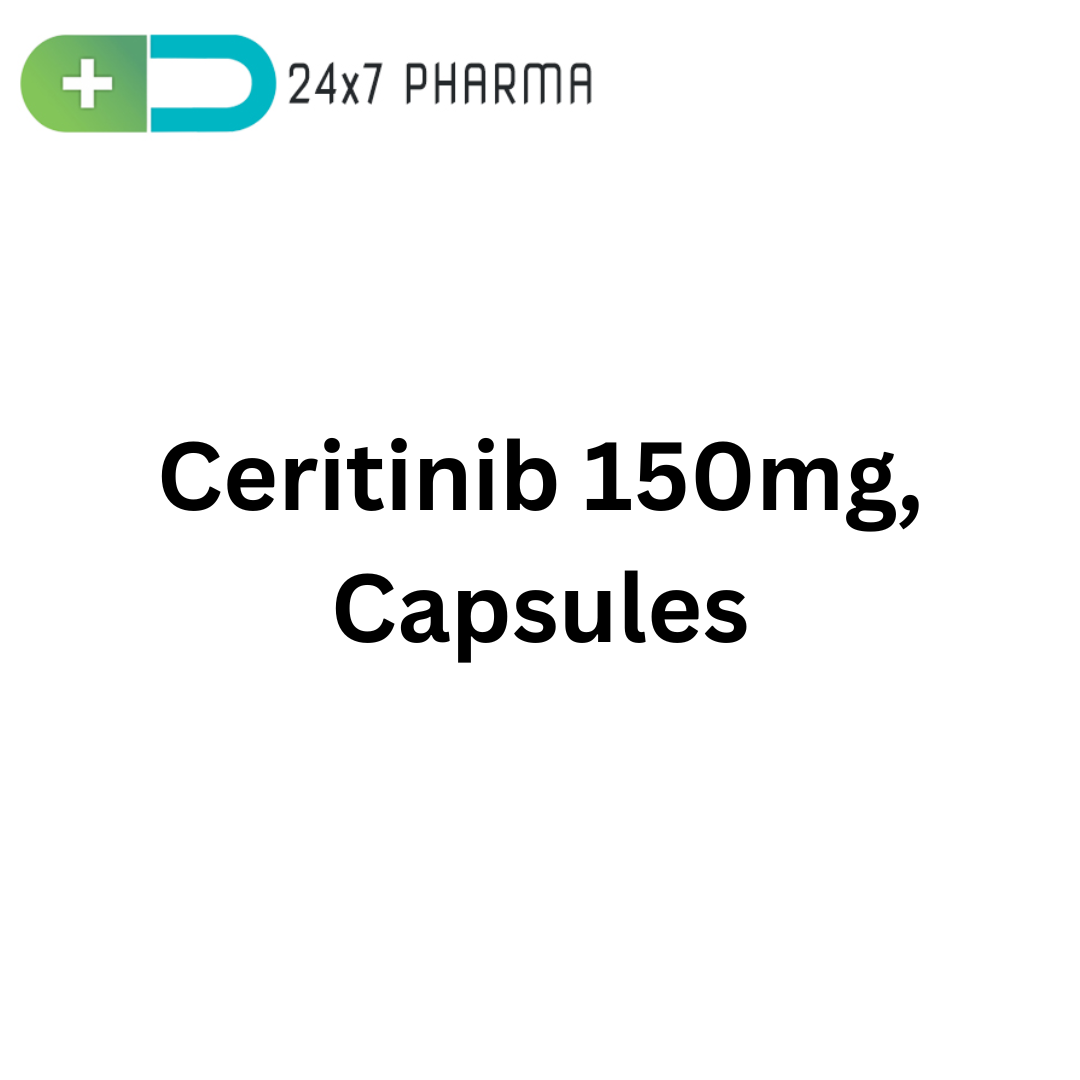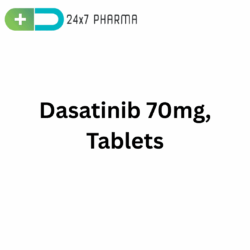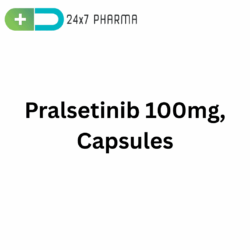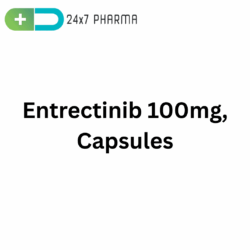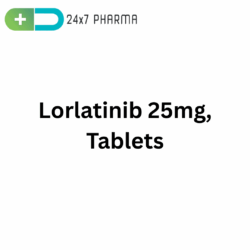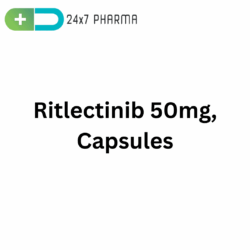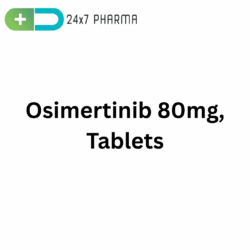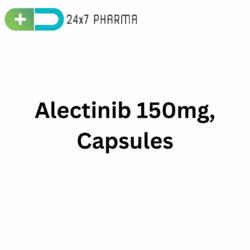LuciCer 150mg, Ceritinib Capsules
LuciCer 150mg is a targeted anticancer medication containing Ceritinib, a selective ALK (anaplastic lymphoma kinase) inhibitor. It is specifically made to treat non-small cell lung cancer (NSCLC) in people who have mutations in the ALK gene. This drug has provided new hope for patients who have developed resistance to first-generation ALK inhibitors or who are newly diagnosed with ALK-positive NSCLC.
What is LuciCer 150mg (Ceritinib)?
LuciCer 150mg is a prescription oral medication used to treat ALK-positive metastatic NSCLC, particularly when other treatments have failed or are unsuitable. The active ingredient, ceritinib, is a second-generation ALK inhibitor that has been approved by international regulatory agencies such as the US FDA and EMA. It is currently offered in various places as branded generics like LuciCer.
How LuciCer Works / Mechanism of Action
Ceritinib targets abnormal ALK proteins produced due to gene rearrangements (most notably EML4-ALK fusion) found in certain lung cancer cells. These altered proteins drive cancer cell growth and survival. By attaching itself to ALK’s ATP-binding site and preventing its kinase activity, its:
- Blocking downstream signaling pathways (e.g., PI3K/AKT, JAK/STAT, RAS/MEK),
- Stopping cancer cell proliferation,
- Inducing apoptosis (programmed cell death).
- This highly selective inhibition makes LuciCer more effective in ALK-positive tumors, especially in cases where resistance to crizotinib (a first-generation ALK inhibitor) has occurred.
How to Use LuciCer / Indications
Indication:
LuciCer is indicated for the treatment of adult patients with ALK-positive metastatic NSCLC. This is confirmed using an FDA-approved diagnostic test that detects ALK gene rearrangements.
Off-label indications are under investigation and include other ALK-positive solid tumors, but such use should be strictly guided by an oncologist.
How to Take LuciCer / Dosage
The standard dose of LuciCer (Ceritinib) is:
- Take 450 mg once a day with food, ideally a low-fat meal.
- Previously, Ceritinib was prescribed at 750 mg once daily on an empty stomach, but due to gastrointestinal side effects, newer regimens recommend lower doses with food to improve tolerability and maintain efficacy.
Administration Tips:
- Every day, take the medication at the same time.
- The capsules should not be broken, chewed, or crushed.
- Take the following dose as planned and skip the one that was missed by more than 12 hours.
- Avoid grapefruit juice while on this medication.
Other Dosage Forms or Strengths
LuciCer is available as 150mg capsules, allowing flexible dosing adjustments (e.g., 300 mg, 450 mg, or 600 mg) based on:
- Patient tolerance,
- Liver function,
Side Effects
LuciCer can cause a variety of side effects, some common and some serious. Regular monitoring by a healthcare provider is necessary.
Common Side Effects:
- Nausea and vomiting
- Diarrhea
- Abdominal pain
- Fatigue
- Decreased appetite
- Constipation
- Rash
- Elevated liver enzymes (ALT, AST)
Serious Side Effects:
- Hepatotoxicity (liver damage)
- Interstitial lung disease (ILD)/pneumonitis
- QT interval prolongation (heart rhythm disturbance)
- Hyperglycemia (high blood sugar)
- Bradycardia (slow heart rate)
- Pancreatitis
- If any severe symptoms appear (e.g., shortness of breath, chest pain, jaundice, severe fatigue), medical attention should be sought immediately.
Storage
To preserve its effectiveness, it should be:
- Stored at room temperature (15°C to 30°C),
- Protected from moisture and heat,
- Kept in the original container,
- Out of reach of children and pets.
- Do not use the capsules after the expiration date printed on the label.
Benefits
LuciCer provides significant benefits to a specific group of NSCLC patients:
- Targeted action: Directly inhibits the molecular driver (ALK) of the tumor.
- Effective in crizotinib-resistant cases: Active even when resistance develops.
- Increased survival: Increases overall response rates (ORR) and progression-free survival (PFS).
- Oral dosing: Enables convenient at-home treatment.
- CNS activity: Helpful for individuals with brain metastases, it has been demonstrated to permeate the central nervous system.
Prescription
LuciCer is a prescription-only medication and should be prescribed by a medical oncologist or qualified healthcare professional after confirming the presence of ALK rearrangement using diagnostic testing (e.g., FISH, IHC, NGS).
Self-medication or use without proper diagnosis and supervision is strongly discouraged.
Drug Interactions
Ceritinib interacts with several medications and substances:
- Major interactions: Ceritinib levels are raise by CYP3A4 inhibitors (such as ketoconazole), which may be hazardous.
- CYP3A4 inducers (e.g., rifampin): Decrease efficacy.
- Drugs that prolong QT interval (e.g., amiodarone, haloperidol): Additive risk for arrhythmia.
- Antidiabetic agents: Ceritinib can affect blood sugar levels—monitoring is essential.
- Antacids and PPIs: May affect absorption.
Always inform the doctor about all current medications, including herbal and over-the-counter drugs.
FAQs
Can I take LuciCer during pregnancy?
It is not recommend. Ceritinib can harm an unborn baby. Use effective contraception during treatment and for several weeks afterward.
Is LuciCer a chemotherapy drug?
No, it is a targeted therapy that blocks ALK-positive cancer cells, not traditional chemotherapy.
How long will I have to take LuciCer?
Until the cancer worsens or you develop serious side effects.
Conclusion
LuciCer 150mg (Ceritinib) is a powerful ALK-inhibitor used to treat ALK-positive metastatic NSCLC, especially in patients who are resistant to earlier treatments like crizotinib. Its targeted mechanism offers a more focused and effective approach than traditional chemotherapy, with improved survival outcomes and quality of life. While it does carry the risk of side effects and drug interactions, careful medical supervision and patient compliance can maximize its therapeutic potential. Always follow your oncologist’s guidance and attend regular follow-ups for best outcomes with LuciCer therapy.

